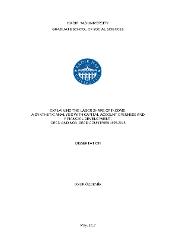| dc.contributor.advisor | Ertan, Sabri Arhan | en_US |
| dc.contributor.author | Özdemir, Onur | |
| dc.date.accessioned | 2019-07-12T08:29:58Z | |
| dc.date.available | 2019-07-12T08:29:58Z | |
| dc.date.issued | 2017 | |
| dc.identifier.uri | https://hdl.handle.net/20.500.12469/1870 | |
| dc.description.abstract | The negative influences of economic downturn which started with the 2007-2008 crisis still maintain to affect the global economy as of 2017. in this framework current mainstream economic policies are being re-examined and need to be renewed. Especially with the Keynesian paradigm coming to the point of collapse at socio-economic scale since 1970s the exacerbating anti-labor movements have obtained the power to enforce the fundamental policy proposals all over the world. Among many different kinds of approaches neo-liberal policy unity and thereby the neoclassical paradigm were the ones that had taken the power. However this transformation within the system was not being easy due to the changes in the interests of the socio-economic and political base of the interests of policymakers and of agents. in other words on a class-based the neoliberal period in which the labor-capital conflict has reached its most serious level in history required of the organization of many parameters especially by pressure in favor of capital. in its essence neoliberalism can be also regarded as a social economic and political counter-attack against the labor-based gains obtained in the Keynesian period within the labor-capital accord. At the scientific level it is possible to obtain evidences or outcomes in many different spheres (e.g. the rate of unionization the level of unemployment rate flexible labor market policies and cheap labor-based production planning). However the most important example of this case in the macroeconomic framework can be understood in falling labor share ratios. As will be noted in the study this decline is valid both for developed and developing country groups. | en_US] |
| dc.language.iso | eng | en_US |
| dc.publisher | Kadir Has Üniversitesi | en_US |
| dc.rights | info:eu-repo/semantics/openAccess | en_US |
| dc.subject | Labor share of income | en_US |
| dc.title | Explaining the labor share of income :a synthetic analysis with capital account openness and financial development OECD and non-OECD countries 1995-2015 | en_US |
| dc.type | doctoralThesis | en_US |
| dc.department | Enstitüler, Lisansüstü Eğitim Enstitüsü, Ekonomi Ana Bilim Dalı | en_US |
| dc.relation.publicationcategory | Tez | en_US |
| dc.identifier.yoktezid | 476853 | en_US |
















